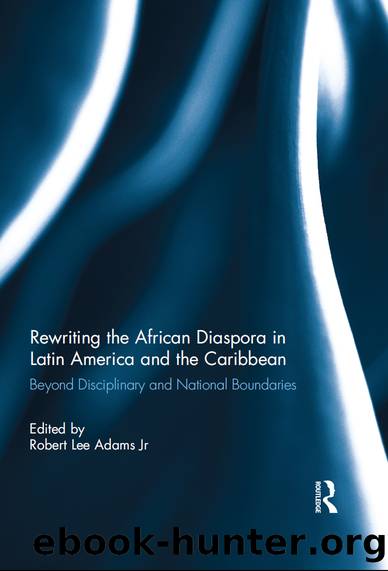Rewriting the African Diaspora in Latin America and the Caribbean by Robert L. Adams Jr

Author:Robert L. Adams Jr. [Adams, Robert L. Jr.]
Language: eng
Format: epub
ISBN: 9781138383074
Barnesnoble:
Publisher: Taylor & Francis
Published: 2018-08-14T00:00:00+00:00
West African Ãkpè history and aesthetics in Cuban Abakuá chants
Ãkue Usagaré akuaramina Usagaré
Ãkpè began in Usagaré
(Cuban Abakuá march)
Cuban Abakua lore indicates that âUsagaréâ was the source community of their society in West Africa. Cross River Ãkpè also regard âUsaghadeâ as a source for the esoteric aspects of their traditions. Lying near the coastal Atlantic border of Nigeria and Cameroon, âIsangeleâ is close to the city of Calabar in the Cross River basin. Isangele is the colonial name; locals call it Usak-Ade, essentially the same pronunciation as that of Cuban Abakuá.
Prince Mosongo, a member of the noble founding family of Usaghade, wrote a history of his community called An X-Ray on Bakassi Peninsular, claiming that âI have been directed by our Ancestors and unanimously agreed by the entire tribe to present this book.â Mosongo (1995, p. 5) aims to âprovoke intensive research into our various Isangele controversial clans, that would enable us to invite specialists to finally provide explicit chronologies for our events and summarize our history â¦â In their search for their local history, little did Cross River people expect that evidence would be found in the chants of their spiritual descendants, the Cuban Abakuá. During the early period of the transatlantic slave trade, according to legend, the Ãfìk traders of Old Calabar received fundamental elements of Ãkpè from Usaghade (Miller 2009, pp. 46â47). After making elaborations, they transmitted their âmodernâ form of Ãkpè throughout their trading empire.
From a Cross River region far northwest of Usaghade, Ãbìbìò musicologist Samuel Akpabot learned that, as in Cuba, local mythology points to the transmission of Ãkpè from Usaghade: âTradition has it that Ãkpè originally came from a place called Usangade [sic] where the Efot ethnic group live in the [peninsula near] Calabar; it was they who let the Ãbìbìò people of Uruan into the secrets of the cult.â Part of the evidence for this history is that Ãbìbìò Ãkpè use a non-Ãbìbìò language in ceremony. Akpabot (1975, p. 32) wrote:
Members of the Ãkpè society greet one another with these code words: Cantor: Uyo bari bari nya nkpe ⦠These words are not easy to translate into English since they are not Ãbìbìò words and their origin is not easily traceable. They are more like nonsense words with a special meaning to Ãkpè society members.
The terms are Ãjághám or Balondo, two languages common in southwestern Cameroon, of which Usaghade forms a part. Prince Mosongo agreed that Ãkpè sources are âtraced from Usak-Edet (Balondo land) in Cameroon. This is reinforced by the fact that most Ãkpè songs [in southwest Cameroon] are in Balondo languageâ (Mosongo 1995, p. 80). As seen from these examples, linguistic evidence is fundamental to the identification of the sources of Ãkpè in West Africa, a method already used to identify the West African source regions of Cuban Abakuá (Manfredi 2004; Miller 2005).
After searching the archives in Calabar, the only musical recordings I found were made by Ãfìk Ãkpè; there were none by Ãkpè musicians from Usaghade, Oban, and other ethnic settlements with Ãkpè traditions.
Download
This site does not store any files on its server. We only index and link to content provided by other sites. Please contact the content providers to delete copyright contents if any and email us, we'll remove relevant links or contents immediately.
| Anthropology | Archaeology |
| Philosophy | Politics & Government |
| Social Sciences | Sociology |
| Women's Studies |
Born to Run: by Christopher McDougall(7121)
The Leavers by Lisa Ko(6945)
iGen by Jean M. Twenge(5409)
Sapiens by Yuval Noah Harari(5366)
Spare by Prince Harry The Duke of Sussex(5181)
The Kite Runner by Khaled Hosseini(5170)
Machine Learning at Scale with H2O by Gregory Keys | David Whiting(4295)
Bullshit Jobs by David Graeber(4179)
Never by Ken Follett(3937)
Goodbye Paradise(3802)
Livewired by David Eagleman(3765)
Fairy Tale by Stephen King(3370)
A Dictionary of Sociology by Unknown(3077)
Harry Potter 4 - Harry Potter and The Goblet of Fire by J.K.Rowling(3061)
The Social Psychology of Inequality by Unknown(3020)
The Club by A.L. Brooks(2919)
Will by Will Smith(2911)
0041152001443424520 .pdf by Unknown(2843)
People of the Earth: An Introduction to World Prehistory by Dr. Brian Fagan & Nadia Durrani(2733)
